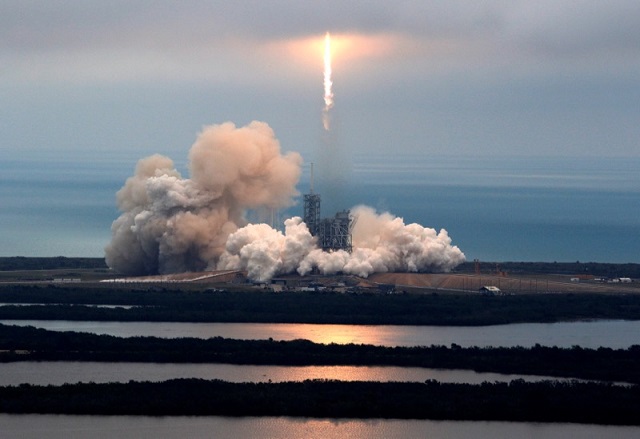
On a clear autumn evening at 6:53 pm (2253 GMT), the tall, white Falcon 9 rocket blasted off from Cape Canaveral, Florida carrying the Echostar 105/SES-11 satellite.
"Couldn't be more perfect weather for a launch," said a commentator on SpaceX's live webcast.
The satellite aims to provide television coverage and communications capabilities to North America, Hawaii, Mexico and the Caribbean.
It is a "dual-mission" satellite for the US-based operator EchoStar and Luxembourg-based operator SES.
Geek fight! Musk says Zuckerberg naive about killer robots
About 10 minutes after launch, the tall portion of the rocket, known as the first stage, returned to Earth for a controlled, upright landing on a droneship called "Of Course I Still Love You," stationed in the Atlantic.
The Falcon 9 rocket "is currently standing on the deck," said the SpaceX commentator, as video images showed the smoking rocket securely parked on the platform.
"Yet another successful landing of a Falcon 9 first stage," he added.
"This is our 18th successful landing."
https://www.instagram.com/p/BaIedUvBk5p/?taken-by=elonmusk
The Falcon 9's first stage which launched Wednesday had previously flown on a cargo mission to the International Space Station in February.
SpaceX flew a recycled rocket component for the first time in March of this year.
Space 'science laboratory' finds a new way to explore Mars
Wednesday's launch was its "third successful mission with a flight-proven orbital class rocket," SpaceX said on Twitter.
The effort is part of CEO Elon Musk's broader vision of making spaceflight more affordable and enabling easier, more economical rocket travel, both from city to city on Earth and eventually to deep space.

1721377568-0/BeFunky-collage-(18)1721377568-0-165x106.webp)




1719640649-0/BeFunky-collage-(77)1719640649-0-270x192.webp)
















COMMENTS
Comments are moderated and generally will be posted if they are on-topic and not abusive.
For more information, please see our Comments FAQ